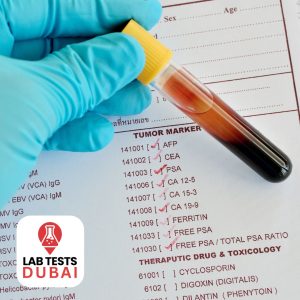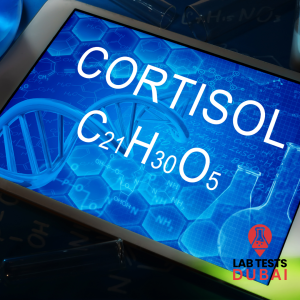
Gastrin Lab Test – Accurate Gastrin Level Testing for Stomach Health
650,00 د.إ
Gastrin Lab Test measures the level of gastrin, a hormone that stimulates acid production in the stomach. It is essential for diagnosing conditions such as Zollinger-Ellison syndrome, gastrin-secreting tumors, and chronic atrophic gastritis.
Sample Type : Serum
Methodology : Chemiluminescence
TAT : 10 Days
Description
Gastrin Lab Test – Accurate Gastrin Level Testing for Stomach Health
The Gastrin Lab Test from Lab Tests Dubai is a specialized blood-based diagnostic assay that measures levels of gastrin, a hormone produced by G-cells in the stomach and duodenum that stimulates gastric acid secretion.
While stomach acid is essential for digestion, excess gastrin can lead to dangerous acid overproduction, causing:
- Recurrent peptic ulcers
- Severe gastroesophageal reflux (GERD)
- Chronic diarrhea
- Gastrin-secreting tumors (gastrinomas)
- Zollinger-Ellison Syndrome (ZES) – a rare but serious condition
This test is essential for:
- Diagnosing Zollinger-Ellison Syndrome
- Investigating refractory ulcers or diarrhea
- Monitoring patients after gastric surgery or long-term PPI use
- Evaluating pancreatic or duodenal tumors
Using high-sensitivity chemiluminescence technology, this serum-based test delivers accurate results within 10 days, helping gastroenterologists and endocrinologists pinpoint the cause of chronic digestive issues.
Available with home blood collection, Lab Tests Dubai ensures accurate, private, and stress-free testing—so you can get answers without disruption to your care.
Why You Need This Test
If you’re suffering from ulcers that won’t heal, severe heartburn despite medication, or chronic diarrhea, this test could reveal a rare but treatable cause.
You need the Gastrin Test if:
- You have recurrent peptic ulcers (gastric or duodenal)
- Your GERD or heartburn doesn’t respond to PPIs (e.g., omeprazole)
- You experience chronic watery diarrhea without clear cause
- You’ve been diagnosed with multiple endocrine neoplasia type 1 (MEN1)
- You have a pancreatic or duodenal mass on imaging
- You’ve had gastric surgery (e.g., antrectomy)
Gastrin levels help differentiate:
- Zollinger-Ellison Syndrome (very high gastrin + high acid)
- Chronic atrophic gastritis (high gastrin due to low acid)
- Proton Pump Inhibitor (PPI) use (common cause of elevated gastrin)
This test is not routine—but critical when red flags are present.
Symptoms That Indicate This Test
Consider the Gastrin Test if you experience:
✅ For Zollinger-Ellison Syndrome:
- Recurrent peptic ulcers (even after treatment)
- Severe, burning abdominal pain
- Persistent heartburn or acid regurgitation
- Chronic watery diarrhea (due to acid inactivation of pancreatic enzymes)
- Unexplained weight loss
- Nausea or vomiting
✅ For Gastrinoma (Tumor):
- Symptoms above + pancreatic/duodenal tumor on CT/MRI
- Family history of MEN1 syndrome
✅ For Chronic Gastric Issues:
- Long-term PPI use with rising symptoms
- Post-gastrectomy monitoring
- Autoimmune gastritis (pernicious anemia, low B12)
These symptoms may indicate pathological acid overproduction—and this test helps rule in or out a gastrinoma.
Natural Production: How Gastrin Regulates Stomach Acid
Gastrin is a peptide hormone released by G-cells in the antrum of the stomach and duodenum.
It works by:
- Stimulating parietal cells to secrete hydrochloric acid (HCl)
- Promoting gastric motility and mucosal growth
Gastrin is released in response to:
- Food (especially protein)
- Stomach distension
- Vagal stimulation (stress)
Inhibited by:
- Low gastric pH (<3) – negative feedback
- Somatostatin
- Secretin
Normal Fasting Gastrin Levels:
- <100 pg/mL (varies by lab)
Elevated Levels May Indicate:
- Zollinger-Ellison Syndrome (>10x normal, often >500 pg/mL)
- Chronic atrophic gastritis (loss of acid-producing cells)
- Long-term PPI use (common, reversible cause)
- G-cell hyperplasia or gastrinoma
This test is often paired with gastric pH testing and secretin stimulation test for confirmation.
What Happens If Untreated? Risks of Ignoring High Gastrin
Ignoring high gastrin levels can lead to:
⚠️ Perforated Peptic Ulcers – life-threatening peritonitis
⚠️ GI Bleeding – from multiple ulcers
⚠️ Malabsorption & Weight Loss – from acid inactivation of enzymes
⚠️ Tumor Growth & Metastasis – gastrinomas can spread to liver
⚠️ Delayed Diagnosis of MEN1 – a hereditary cancer syndrome
The good news? Zollinger-Ellison Syndrome is treatable with:
- High-dose PPIs (e.g., pantoprazole)
- Surgical resection of gastrinoma
- Somatostatin analogs (e.g., octreotide)
- Genetic testing for MEN1
Early testing = prevention of complications and better outcomes.
How to Prepare for the Test
To ensure accurate results:
✅ Fast for 8–12 hours (water allowed)
✅ Stop PPIs (proton pump inhibitors) for 1–2 weeks before testing (only under doctor’s supervision)
✅ Avoid H2 blockers (e.g., ranitidine) and antacids 24 hours before
✅ Inform your doctor of:
- Current medications (especially acid reducers)
- History of gastric surgery
- Diagnosis of MEN1 or pancreatic tumors
A serum blood sample is collected via standard draw—available at our labs or via home collection.
Test Overview: High-Sensitivity Chemiluminescence Method
Interpretation:
- <100 pg/mL → Normal (if off PPIs)
- 100–500 pg/mL → Moderate elevation (check PPI use, pH)
- >500 pg/mL + low gastric pH → High suspicion of ZES
Results are reported with clinical notes for your gastroenterologist.
FAQs About the Gastrin Test
Q: Can PPIs raise gastrin levels?
A: Yes. PPIs suppress acid, leading to compensatory gastrin rise. Stop PPIs 1–2 weeks before testing if possible.
Q: Is this test diagnostic for ZES?
A: Not alone. High gastrin + low gastric pH + secretin stimulation test confirms ZES.
Q: Can I have high gastrin without a tumor?
A: Yes. Atrophic gastritis, PPI use, or renal failure can elevate levels.
Q: Can I book without a doctor’s referral?
A: Yes! Lab Tests Dubai allows direct online booking—ideal for follow-up testing.
Q: How will I get results?
A: A secure digital report is emailed within 10 business days, including gastrin level and clinical notes.
Q: Is this test covered by insurance?
A: Yes. GI hormone testing is medically necessary—covered by most UAE insurers for refractory ulcers or tumor screening.
If you’re tired of endless ulcers, heartburn, or diarrhea, the Gastrin Test gives you the answers you need in 10 days—so you can finally get the right treatment.





Reviews
There are no reviews yet.